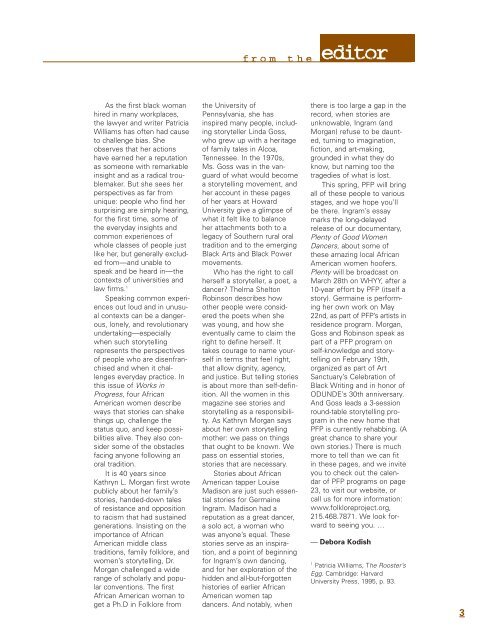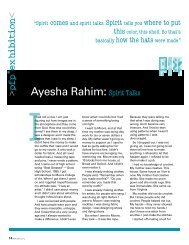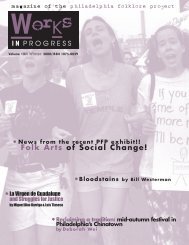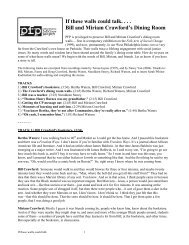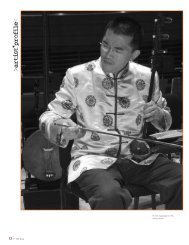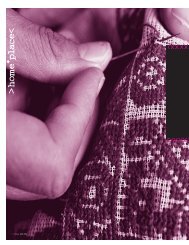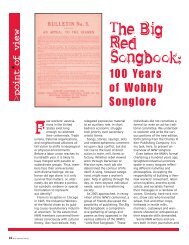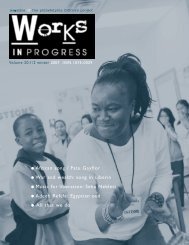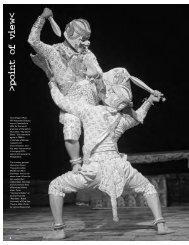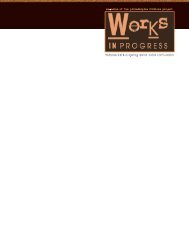View PDF - Philadelphia Folklore Project
View PDF - Philadelphia Folklore Project
View PDF - Philadelphia Folklore Project
- No tags were found...
You also want an ePaper? Increase the reach of your titles
YUMPU automatically turns print PDFs into web optimized ePapers that Google loves.
from theeditorAs the first black womanhired in many workplaces,the lawyer and writer PatriciaWilliams has often had causeto challenge bias. Sheobserves that her actionshave earned her a reputationas someone with remarkableinsight and as a radical troublemaker.But she sees herperspectives as far fromunique: people who find hersurprising are simply hearing,for the first time, some ofthe everyday insights andcommon experiences ofwhole classes of people justlike her, but generally excludedfrom—and unable tospeak and be heard in—thecontexts of universities andlaw firms. 1Speaking common experiencesout loud and in unusualcontexts can be a dangerous,lonely, and revolutionaryundertaking—especiallywhen such storytellingrepresents the perspectivesof people who are disenfranchisedand when it challengeseveryday practice. Inthis issue of Works inProgress, four AfricanAmerican women describeways that stories can shakethings up, challenge thestatus quo, and keep possibilitiesalive. They also considersome of the obstaclesfacing anyone following anoral tradition.It is 40 years sinceKathryn L. Morgan first wrotepublicly about her family’sstories, handed-down talesof resistance and oppositionto racism that had sustainedgenerations. Insisting on theimportance of AfricanAmerican middle classtraditions, family folklore, andwomen’s storytelling, Dr.Morgan challenged a widerange of scholarly and popularconventions. The firstAfrican American woman toget a Ph.D in <strong>Folklore</strong> fromthe University ofPennsylvania, she hasinspired many people, includingstoryteller Linda Goss,who grew up with a heritageof family tales in Alcoa,Tennessee. In the 1970s,Ms. Goss was in the vanguardof what would becomea storytelling movement, andher account in these pagesof her years at HowardUniversity give a glimpse ofwhat it felt like to balanceher attachments both to alegacy of Southern rural oraltradition and to the emergingBlack Arts and Black Powermovements.Who has the right to callherself a storyteller, a poet, adancer? Thelma SheltonRobinson describes howother people were consideredthe poets when shewas young, and how sheeventually came to claim theright to define herself. Ittakes courage to name yourselfin terms that feel right,that allow dignity, agency,and justice. But telling storiesis about more than self-definition.All the women in thismagazine see stories andstorytelling as a responsibility.As Kathryn Morgan saysabout her own storytellingmother: we pass on thingsthat ought to be known. Wepass on essential stories,stories that are necessary.Stories about AfricanAmerican tapper LouiseMadison are just such essentialstories for GermaineIngram. Madison had areputation as a great dancer,a solo act, a woman whowas anyone’s equal. Thesestories serve as an inspiration,and a point of beginningfor Ingram’s own dancing,and for her exploration of thehidden and all-but-forgottenhistories of earlier AfricanAmerican women tapdancers. And notably, whenthere is too large a gap in therecord, when stories areunknowable, Ingram (andMorgan) refuse to be daunted,turning to imagination,fiction, and art-making,grounded in what they doknow, but naming too thetragedies of what is lost.This spring, PFP will bringall of these people to variousstages, and we hope you’llbe there. Ingram’s essaymarks the long-delayedrelease of our documentary,Plenty of Good WomenDancers, about some ofthese amazing local AfricanAmerican women hoofers.Plenty will be broadcast onMarch 28th on WHYY, after a10-year effort by PFP (itself astory). Germaine is performingher own work on May22nd, as part of PFP’s artists inresidence program. Morgan,Goss and Robinson speak aspart of a PFP program onself-knowledge and storytellingon February 19th,organized as part of ArtSanctuary’s Celebration ofBlack Writing and in honor ofODUNDE’s 30th anniversary.And Goss leads a 3-sessionround-table storytelling programin the new home thatPFP is currently rehabbing. (Agreat chance to share yourown stories.) There is muchmore to tell than we can fitin these pages, and we inviteyou to check out the calendarof PFP programs on page23, to visit our website, orcall us for more information:www.folkloreproject.org,215.468.7871. We look forwardto seeing you. …— Debora Kodish1Patricia Williams, The Rooster’sEgg. Cambridge: HarvardUniversity Press, 1995, p. 93.3


